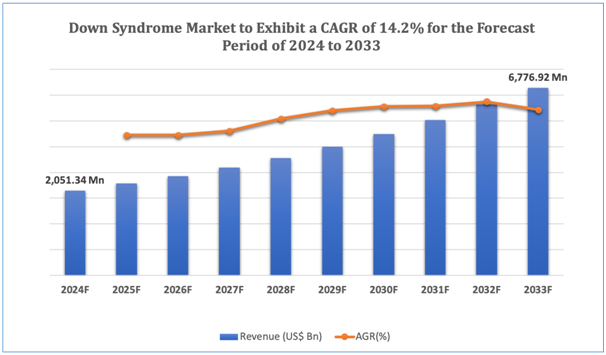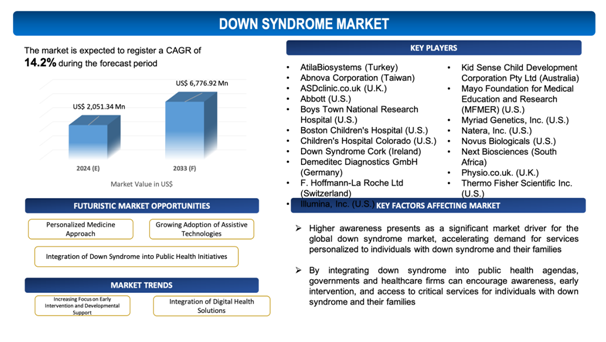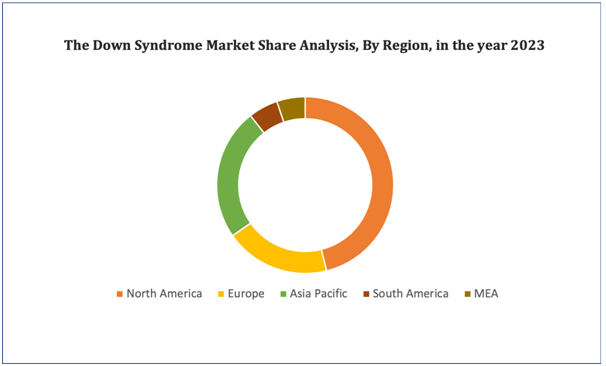Down Syndrome Market Overview
The global Down Syndrome market is estimated to be worth over USD 6,776.92 Mn in 2033 and is expected to grow at CAGR of 14.2% during the forecast period (2024-2033).
Down syndrome, a genetic disorder provoked by the presence of an extra copy of chromosome 21, presents a scope of developmental hindrances and physical traits. Individuals with down syndrome usuallyshowcase cognitive disability, unique facial features, and a higher risk of various medical conditions, such as congenital heart deficiencies and respiratory problems. Notwithstanding with these barriers, progressions in medical care and early intervention programs have substantiallyenhanced the quality of life and life expectancy for individuals with down syndrome.
The global market for down syndrome embodies a scale of products and services focused at acknowledging the varied needs of individuals with this condition and their families. Major segments within this market comprise therapeutic interventions, diagnostic testing, support services, and advocacy initiatives. Diagnostic testing holds a critical role in determiningdown syndrome prenatally through techniques such as prenatal screening and diagnostic tests, allowing parents to make informed decisions about their pregnancies. In addition to that, postnatal diagnostic testing assists in confirming the diagnosis and guiding early intervention strategies.
Therapeutic interventions for down syndrome emphasize on addressing the developmental, cognitive, and medical needs of affected individuals. This comprises educational programs, speech and occupational therapy, and medical interventions to administer associated health conditions. Along with that, the market surrounds a diverserange of support services tailored to individuals with down syndrome and their families, comprisingcounselling, social support networks, and community resources focused at supporting inclusion and independence.
Progressions in medical research and technology persist to fuel innovation within the down syndrome market, with continual efforts focused on developing targeted therapies to address specific aspects of the condition, such as cognitive impairment and related medical comorbidities. Also, advocacy organizations and initiatives hold a crucial role in raising awareness, supporting research, and advocating for the rights and inclusion of individuals with down syndrome on a worldwide scale.
Overall, the down syndrome market indicates a multidisciplinary approach to addressing the intricate needs of individuals with this condition, with a soaring emphasis on personalized care, early intervention, and supporting inclusion and opportunities for those affected. As awareness and understanding of down syndrome continue to evolve, the market is estimated to witness further growth and innovation, ultimately enhancing outcomes and quality of life for individuals living with this genetic disorder across the globe.
Figure 1. Down Syndrome: Market Size

Get more details on this report - Request Free Sample
Key Market Insights &Current Market Landscape:
The global down syndrome market showcasesnumerous key market insights and a dynamic panoramadefined by substantial developments and novel technologies. Significant insights comprise a soaring emphasis on early diagnosis and intervention, accelerating demand for prenatal and postnatal screening tests, along with the therapeutic interventions focused at improving cognitive and developmental outcomes for individuals with down syndrome. In addition to that, there is a growing emphasis on personalized medicine and targeted therapies, with persistent research efforts focused at determining biomarkers and molecular targets associated with down syndrome to develop more effective treatment alternatives.
The current market landscape surrounds a variedarray of products and services, comprising diagnostic tests, therapeutic interventions, support services, and advocacy initiatives. Prenatal screening tests such as non-invasive prenatal testing (NIPT) and cell-free DNA testing have gained traction for their precision and early detection capabilities, facilitating expectant parents to make informed decisions about their pregnancies. Postnatal diagnostic tests, including karyotyping and chromosomal microarray analysis, remain crucial for confirming down syndrome diagnoses and steering early intervention strategies.
With regard to therapeutic interventions, there has been an increasing interest in pharmaceutical and biotechnological approaches to determine cognitive impairment and associated medical comorbidities in individuals with down syndrome. Targeted therapies focused at controllingparticular molecular pathways involved in the condition, such as synaptic plasticity and neurodevelopment, hold commitment for enhancing cognitive function and quality of life. Along with that, progressions in assistive technologies, such as wearable devicesand mobile applications, are promoting communication, learning, and independent living skills among individuals with Down syndrome, enhancing their overall well-being and inclusion in society. Since research and innovation persist to accelerate the down syndrome market forward, there is optimism for further progresses in diagnosis, treatment, and support services, ultimately enhancing outcomes for individuals affected by this genetic disorder across the world.
Market Dynamics
Market Drivers
Greater Awareness Fuels Demand for Services
Higher awareness presents as a significant market driver for the global down syndrome market, accelerating demand for services personalized to individuals with down syndrome and their families. Since awareness of down syndrome diversifies across varied stakeholders, comprising policymakers, healthcare professionals, and the general public, there surfaces an escalated understanding of the specialized needs and challenges witnessed by individuals with this genetic condition. This improved awareness fosters a more supportive environment for the development and delivery of diagnostic, therapeutic, and support services particularly designed to identify the diverse requirements of individuals with down syndrome.
With soaring awareness comes a recognition of the importance of early intervention and comprehensive care in optimizing outcomes for individuals with down syndrome. As a consequence, there is a growing demand for an array of services surrounding early screening and diagnosis, specialized medical care, educational support, therapeutic interventions, and social inclusion programs. For good measure, as societal perceptions and attitudes toward disability continue to evolve, there is an increasing focus on supporting equality, inclusivity, and opportunities for individuals with down syndrome.
The surge in demand for down syndrome-related services underscores the necessity of addressing the holistic needs of individuals with this condition within the healthcare ecosystem. This comprises not only medical interventions but also psychosocial support, advocacy initiatives, and community resources aimed at fostering independence and enhancing quality of life. Since awareness continues to rise and advocacy efforts gain prominence, the global down syndrome market is anticipated to witness further expansion, with an emphasis on delivering comprehensive and personalized care to individuals with down syndrome globally.
Market Restraints
With regard to numerous advantages of Down Syndrome, the market faces several challenges due to the unique characteristics and requirements associated with them. Some of the key market challenges include:
- Limited Treatment Options:The inadequacy of particular pharmacological interventions customized to acknowledge the underlying causes of down syndrome poses a substantial market restraint.Current therapeutic alternativesmajorlyemphasize on administeringsymptoms and associated medical conditions, rather than targeting the core genetic abnormalities, confining the scope for substantial treatment advancements.
- Regulatory Challenges:Stringent regulatory requirements for the development and approval of novel therapeutic interventions tailored to down syndrome pose significant barriers. Limited understanding of the complex genetic and physiological mechanisms underlying down syndrome complicates the regulatory pathway, resulting in prolonged development timelines and higher costs for potential treatments.
Market Opportunities
Integration of Down Syndrome into Public Health Initiatives
Since public health strategies develop to emphasize inclusivity and equity for all individuals, there is a soaringrecognition of the prominence of confronting the particular needs of those with down syndrome within comprehensive healthcare frameworks. By integratingdown syndrome into public health agendas, governments and healthcare firms can encourage awareness, early intervention, and access to critical services for individuals with down syndrome and their families.
This integration comprises implementing screening programs, developing guidelines for early diagnosis and intervention, and diversifying access to specialized medical care, educational support, and community resources. In addition to that, it fosters collaborations among researchers, healthcare providers, advocacy groups, and policymakers, fuelling innovation, advancing research, and enhancing outcomes for individuals with down syndrome.
By approving an extensive approach within public health initiatives, stakeholders can improve the quality of life and well-being of individuals with down syndrome while also creating fertile ground for market growth. This expansion of down syndrome-associated services and interventions on a worldwide scale not only meets the developing needs of affected individuals and their families but also opens new horizons for market development and innovation within the down syndrome healthcare field.
Market Trends
- Growing Focus on Early Intervention & Developmental Support:There's an increasing trend towards recognizing the prominence of early intervention in maximizing outcomes for individuals with down syndrome. Early screening and diagnosis enable timely access to developmental support services, such as speech and occupational therapy,early childhood intervention programs, and educational support.Healthcare providers and policymakers are increasingly prioritizing the implementation of comprehensive early intervention programs customized to the particular needs of individuals with down syndrome. These programs emphasizeon addressing developmental delays, support cognitive and social skills, and enhance overall quality of life. Since awareness of the advantages of early intervention grows, there is an equivalent surge in demand for specialized services and support resources focused at maximizing the potential and independence of individuals with down syndrome from an early age.

Get more details on this report - Request Free Sample
Down Syndrome Market: Key Segments
By Disease Type
- Trisomy 21
- Translocation Down Syndrome
- Mosaic Down Syndrome
By Treatment
- Diagnosis
- Therapy
By End User
- Hospital
- Clinics
- Homecare Setting
- Therapy Centers
- Others
By Distribution Channel
- Direct Tender
- Retail Sales
- Others
By Key Geographical Regions
- North America
- Europe
- Asia-Pacific
- Middle East and Africa
- South America
Down Syndrome Market: Regional Analysis
The North America, particular the U.S. is expected to lead the down syndrome market, driven by a surge in research and developmental initiatives. With growing investment in innovative therapies and diagnostic advancements, the U.S. is positioned to offer cutting-edge treatments and interventions, solidifying its dominance in the regional market.In Europe, Germany leads the growth of the down syndrome market due to expanding distribution channels. Leveraging a strong infrastructure, Germany efficiently disseminates innovative treatments and services, driving market expansion across the continent.In the Asia-Pacific region, China is dominates down syndrome market's growth, propelled by increasing awareness of the condition and available therapies. With a burgeoning population and expanding healthcare infrastructure, China is driving advancements in down syndrome treatment and support services, shaping market development in the region.
Figure 4. Down Syndrome Market: Distribution by Region

Get more details on this report - Request Free Sample
Leading Down Syndrome Developers
Industry Trends and Global Forecasts, 2023-2035 report features an extensive study of the current market landscape, market size and future opportunities associated with the Down Syndromemarket, during the given forecast period. Further, the market report highlights the efforts of several stakeholders engaged in this rapidly emerging segment of the biopharmaceutical industry. Key takeaways of the Down Syndromemarket are briefly discussed below.
The report includes the list of players operating in the global Down Syndromemarket. Some of the key players include:
- AtilaBiosystems (Turkey)
- Abnova Corporation (Taiwan)
- ASDclinic.co.uk (U.K.)
- Abbott (U.S.)
- Boys Town National Research Hospital (U.S.)
- Boston Children's Hospital (U.S.)
- Children's Hospital Colorado (U.S.)
- Down Syndrome Cork (Ireland)
- Demeditec Diagnostics GmbH (Germany)
- F. Hoffmann-La Roche Ltd (Switzerland)
- Illumina, Inc. (U.S.)
- Kid Sense Child Development Corporation Pty Ltd (Australia)
- Mayo Foundation for Medical Education and Research (MFMER) (U.S.)
- Myriad Genetics, Inc. (U.S.)
- Natera, Inc. (U.S.)
- Novus Biologicals (U.S.)
- Next Biosciences (South Africa)
- Physio.co.uk. (U.K.)
- Thermo Fisher Scientific Inc. (U.S.)
Recent Developments in the Down SyndromeMarket
Several recent developments have taken place in the field of Down Syndrome, some of which have been outlined below. These developments, even if they took place post the release of our market report, substantiate the overall market trends that we’ve outlined in our analysis chronologically.
- In March 2023, Inspire Medical Systems, a medical technology company focused on the development of minimally invasive solutions for patients with obstructive sleep apnea, has received US Food and Drug Administration (FDA) approval to offer Inspire therapy to pediatric patients with Down syndrome.Inspire’s implanted neurostimulator has been prescribed to adults with Down syndrome for several years but previously only to patients who were at least 18 years of age.
Scope of the Report
The market report presents an in-depth analysis of the various firms / organizations that are engaged in this market, across different segments, as defined in the below table:
|
Key Report Attributes |
Details |
|
Base Year |
2023 |
|
Forecast Period |
2024-2033 |
|
CAGR (2024-2033) |
14.2% |
|
Disease Type |
|
|
Treatment |
|
|
End User |
|
|
Distribution Channel |
|
|
Key Geographical Regions |
|
|
Key Companies Profiled |
|
